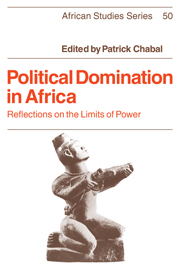Book contents
- Frontmatter
- Contents
- Acknowledgements
- Introduction: Thinking about politics in Africa
- 1 Democracy in Africa
- 2 Politics and vision in Africa: the interplay of domination, equality and liberty
- 3 Democracy and ethnocentrism
- 4 Wails and whispers: the people's voice in West African Muslim politics
- 5 Revolutionary democracy in Africa: the case of Guinea-Bissau
- 6 Civil society in Africa
- 7 Political accountability in African history
- 8 The politics of representation and good government in post-colonial Africa
- Notes
- Index
1 - Democracy in Africa
Published online by Cambridge University Press: 26 January 2010
- Frontmatter
- Contents
- Acknowledgements
- Introduction: Thinking about politics in Africa
- 1 Democracy in Africa
- 2 Politics and vision in Africa: the interplay of domination, equality and liberty
- 3 Democracy and ethnocentrism
- 4 Wails and whispers: the people's voice in West African Muslim politics
- 5 Revolutionary democracy in Africa: the case of Guinea-Bissau
- 6 Civil society in Africa
- 7 Political accountability in African history
- 8 The politics of representation and good government in post-colonial Africa
- Notes
- Index
Summary
I am often asked to explain what possessed me, a white American political scientist, to undertake African studies. Usually, I reflect upon my state of mind in the mid 1950s and mention the allure of a new horizon for democracy, limned by the doctrine of self-determination for subject peoples. Even then, however, realists warned that democracy in Africa, as in Asia, would bleed and die on the altars of national consolidation and social reconstruction. But democracy dies hard. Its vital force is the accountability of rulers to their subjects. Democracy stirs and wakens from the deepest slumber whenever the principle of accountability is asserted by members of a community or conceded by those who rule. Democracy cannot be destroyed by a coup d'état; it will survive every legal assault upon political liberty. The true executioner of democracy has neither sword nor sceptre, but a baneful idea. Ironically, the deadly agent is an idea about freedom.
In Africa today, freedom from want is a universal goal. Millions of lives are blighted by the effects of poverty, unemployment, malnutrition, untended illness, and inadequate education. In all countries, political leaders dedicate themselves to the cause of economic and social development. Most leaders also claim to respect the principle of accountability to the people. However, the imperatives of development are far more demanding than the claims of democracy. Appalled by the human condition and waste of resources in Africa and other non-industrial regions, many intellectuals proclaim the validity of an anti-democratic idea, to which the term ‘developmental dictatorship’ is aptly applied.
- Type
- Chapter
- Information
- Political Domination in Africa , pp. 17 - 29Publisher: Cambridge University PressPrint publication year: 1986
- 6
- Cited by



